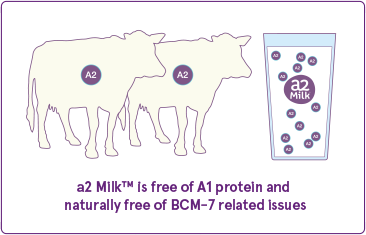In some individuals, the consumption of cows’ milk can elicit lactose intolerance-like symptoms, but other milk components may be involved.1-3 For example, in a group of 406 randomly recruited men and women (mean age 27 years), 20.2% reported abdominal discomfort following dairy intake, but only 6.4% had lactose intolerance diagnosed by a physician.4
There is recent evidence that cows’ milk A1 beta-casein protein is involved in stimulating gastrointestinal symptoms of intolerance in some people, compared with cows’ milk A2 beta-casein protein.2,3
To determine whether a patient’s cows’ milk intolerance is due to A1 beta-casein intolerance, see the adverse milk reactions diagnostic algorithm
What is A1 beta-casein?
Beta-casein is one of the main cows’ milk proteins, comprising around 30% of total protein, and is present as one of two major genetic variants: A1 and A2.5 A2 beta-casein is recognised as the original beta-casein gene variant. The A1 protein is the result of a mutation that arose in the A2 gene in European herds several thousand years ago.5-8
With the exception of a2 Milk™, which contains the A2 protein but not the A1 protein, commercially available cows’ milk contains a mixture of A1 and A2 beta-casein. Of interest, human milk contains A2 beta-casein only and not A1 beta-casein, thus human milk beta-casein protein can be described as ‘A2 like’.
A1 and A2 beta-casein protein in dairy milk5,7,8
In Australia, where dairy cows are of northern European ancestry, the relative proportion of the co-dominant A1 and A2 beta-casein genes in a dairy herd is typically 1:1, resulting in a 1:1 ratio of A1 to A2 beta-casein in their milk. This ratio tends to be lower in breeds from Southern Europe and depends on the specific breeding history of the dominant breeds.
Thus, in Australia most commercially available cows’ milk contains a mixture of A1 and A2 beta-casein. The exception to this is milk produced by dairy cows identified as carrying only the non-mutated A2 beta-casein-expressing gene on both chromosomes (i.e. a2 Milk™). These dairy cows produce milk containing only the A2 beta-casein protein and not the A1 protein.


What is the mechanism for A1 beta-casein effects?
A1 and A2 beta-casein proteins and the release of BCM-72

Cows’ milk A1 beta-casein is different to cows’ milk A2 beta-casein and other mammalian beta-caseins. A1 beta-casein has a histidine amino acid at position 67 of the protein chain. Cows’ milk A2 beta-casein, and the beta-casein proteins from human milk, goat milk, sheep milk and other species’ milk, have a proline amino acid at the equivalent position, making them ‘A2 like’.9-11 Due to this amino acid variation, A1 beta-casein releases the bioactive opioid peptide beta-casomorphin-7 (BCM-7) upon normal enzymatic digestion.12-15 A2 beta-casein limits the release of this compound.
BCM-7 is a beta-casein-derived opioid peptide16-19 which binds to mu-opioid receptors.13,19 Mu-opioid receptors are expressed widely throughout human physiology, including the gastrointestinal tract.20 Mu-opioid receptor activation is known to affect gastrointestinal motility and the mechanics of intestinal propulsion.21
Through mu-opioid receptor activation, A1 beta-casein derived BCM-7 has the potential to stimulate gastrointestinal symptoms in some people.
Because a2 Milk™ is free of A1 beta-casein, some people may experience differences in gastrointestinal symptoms.2,3,39 For more information click here.
a2 Milk™ is produced by cows that do not carry the gene for A1 beta-casein. It is because a2 Milk™ is free of A1 beta-casein that some people may experience differences in gastrointestinal symptoms.2,3
Overview of cows’ milk A1 and A2 beta-casein protein digestion3-8,12-38

- Connector.
Milk herd carrying genes for both beta-casein type proteins
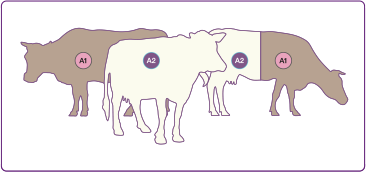
- Connector.
Regular milk containing both beta-casein type proteins is ingested
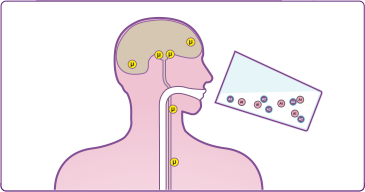
- Connector.
A1 & A2 beta-casein protein fragment digestion in the small intestine
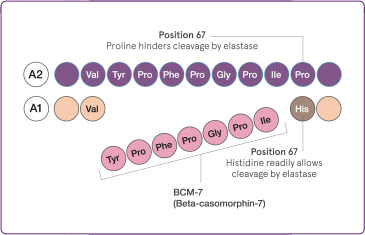
- Connector.
BCM-7 is a mu-opioid receptor ligand
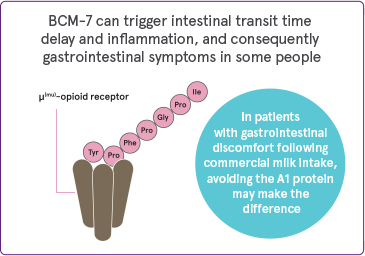
- Connector.
a2 Milk™ is free of A1 protein and naturally free of BCM-7 related issues
